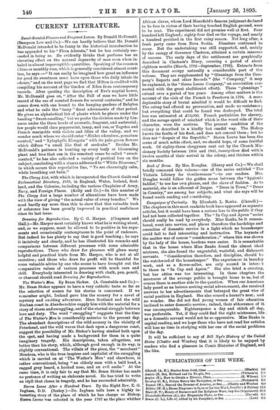CURRENT LITERATURE.
Sweet-Scented Flowers and Fragrant Leaves. By Donald McDonald. (Sampson Low and Co.)—We can hardly believe that Mr. Donald McDonald intended to be funny in the historical introduction he has appended to his "Flora Adorata," but he has certainly suc- ceeded in being so. He evidently thinks that perfume has an elevating effect on the natural depravity of man even when in- haled in almost imperceptible quantities. Speaking of the common China or monthly rose, which is generally considered almost scent- less, he says :—" It can easily be imagined how great an influence for good its sweetness must have upon those who daily inhale its odours," and on the next page we find that Milton is credited with compiling his account of the Garden of Eden from contemporary records. After quoting the description of Eve's nuptial bower, Mr. McDonald goes on, " After the Fall of man we have little record of the use of scented flowers for several centuries," and he comes down with one bound to the banging gardens of Babylon and what he calls the "tasty " floral adornments of that period. He gives an alphabetical list of plants which he places under the heading " Sweet-smelling," but we prefer the division made by Lin- name under the three heads of aromatic, fragrant, and ambrosial; few people would class peppermint, tansy, and rue, or Tagetes and French marigolds with violets and lilies of the valley, and we wonder much where we should enter "2Erides odoratnm, pomatum scented," and " Xylophylla Elongata" with its pale-green flowers which diffuse "a smell like that of seedcake." Besides Mr. McDonald's patience in hunting up every leafy or blossoming plant and tree that can in the remotest sense be called "sweet- scented," he has also collected a variety of poetical lore on the subject, concluding with a stanza addressed to " White Blossoms," in which occurs this superlative line, "Ye are charmingly calm, while breathing out balm."


















































 Previous page
Previous page